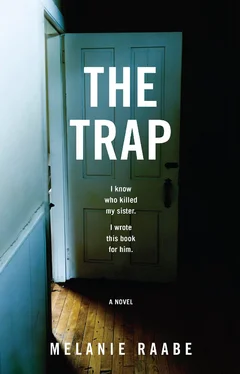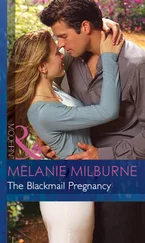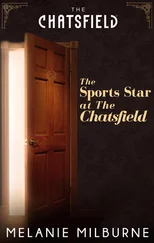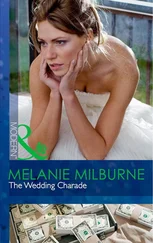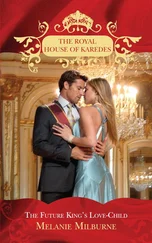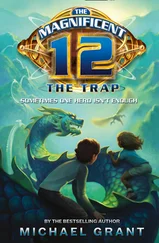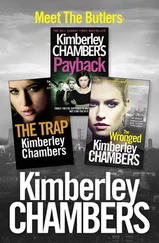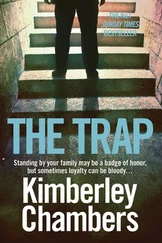But the truth is gnawing away at me, struggling inside, hurling itself about in me like a caged beast trying to break free. Still I believe in my story. I am my story; it’s a good story. And I grow ill; I can no longer leave the house, and I keep the beast locked away and continue to believe in the cold eyes and the stranger.
But the caged beast doesn’t give up, and one day it summons up all its strength — all its brute force — and makes one final attempt. I see a man who resembles the character in my story, and I’m forced to reflect, to return to that night, and I grapple with the man with the cold eyes and fight for a confession, but I will not get it into my head, I will not accept — will not, will not, will not accept — that the confession I am fighting for is my own.
That I am a murderer.
And the rest no more than a good story.
That’s how it could have happened. Something like that.
I stand at the window and look out onto the edge of the woods and the lake.
26
SOPHIE
Sophie stared at the telephone, willing it to ring, but it remained doggedly silent.
She went into the kitchen, took a wineglass from the shelf, filled it to the brim and sat down. She gave a start when she heard a creaking sound.
Only the floorboards. She tried to calm down, taking a gulp of wine and beginning to put her thoughts in order.
She had the feeling she was being followed. But was she really, or was it her nerves, which were now in tatters? No, there had been someone there that night, in the underground car park. And who knows how often he had pursued her since without her noticing.
Sophie looked at her mobile. Still no message from Jonas Weber. She let her index finger hover over the call button, then left it. What was the point? Jonas would only give her a lecture on how she should leave police work to the police and have a bit of confidence in them.
If any kind of progress were to be made, she would have to take the matter into her own hands — that much was clear. She got up and reached for her jacket, but then hesitated and sat down. She switched the TV on — and then off again.
If only she’d got to Britta’s a couple of minutes earlier. If she’d let herself in instead of wasting time ringing the bell. If she’d administered first aid straightaway. If, if, if. Sophie knew it was her guilty conscience driving her to keep busy. She simply had to find the man. But how?
Suddenly, it came to her.
It was essentially easy. She’d seen the murderer and he’d seen her. But while it was true that she hadn’t recognized him, he certainly seemed to know who she was. Somehow he must have found out, for he was following her — trying to catch her on her own so he could do away with the eyewitness to his crime. He wasn’t going to stop. The perfect opportunity hadn’t yet presented itself to him.
What if Sophie served herself up to him on a silver platter? What if she didn’t run the next time she sensed him behind her but stayed put instead?
No, that was completely crazy. Self-destructive.
Sophie leaned back on the sofa and took another gulp of wine. She reflected on the fear Britta must have felt in the last minutes of her life and told herself that fear was not a valid excuse for inaction.
She drank more wine and lay down, staring at the wall. She turned over and stared at the ceiling. The white grew whiter and whiter, gleaming and shimmering before her eyes. But there was something else. Sophie could make out microscopic dark spots, smaller than fruit flies, and yet more than mere specks of color, for when she looked more closely, she saw the black growing before her eyes, puncturing the white and getting thicker and blacker, until all at once she realized what was going on. There was hair sprouting out of the ceiling, thick and black like pubic hair, growing toward her. The ceiling was becoming porous; it would cave in on her if she continued to lie there like that, doing nothing.
Sophie leaped up, drained her wine, and went along the hall to the bedroom, grumbling at the removal boxes that Paul still hadn’t collected. She was furious — at herself, at the world — and would have liked to take one of the stupid golf clubs that were sticking out of the box labeled “Misc.” and bash something with it. She rummaged around in her carryall for the pepper spray she had bought a short while ago, put it in her handbag along with her wallet, keys and mobile, left the flat and stormed down the stairs.
The darkness was velvety and smelled autumnal. Sophie realized that the stifling hot summer had given way to a moody autumn.
She walked along the night streets, moving further and further from the busier parts of town, deeper and deeper into the shadows. She hadn’t really stopped to think about her plan.
A trap for a murderer. With her as bait.
Perfect, provided you weren’t overly attached to life. Sophie realized that she was thinking in the terms of a TV crime drama, with the murderer, the victim, the pesky eyewitness, the nice police officer. Somehow it was easier that way: to view the affair not as a genuine tragedy, not as a real part of her life, but as just another case.
Sophie walked and walked. Fewer and fewer people passed her. It turned chilly — cold, even — and the wind was biting. Sophie unbuttoned her jacket; she wanted to be cold, to shiver, to feel something other than grief or anger at last, even if it was only coldness. Or pain.
Something inside her understood how self-destructive such thoughts were, how crazy this plan was, driven only by her overwhelming feelings of guilt. But Sophie silenced the warning voice and turned into the dark park that lay before her.
She sat down on a bench and waited. She stared into the shadows, growing colder. It wasn’t long before she saw him.
I’m drinking tea in small sips. I had put on music in the hope it would drive away the voices in my head, but it’s not working. Ella Fitzgerald is singing to me about the summertime and easy living, but summer is a long way off and my life feels hard and the voices in my head are still arguing about the truth. In the morning sun, the lake gleams indigo, violet, deep red, orange, yellow, and then pale blue.
I saw Victor Lenzen on that terrible, hot, deep-red night — I’m sure I did.
Linda and her stories.
I saw him.
The way you saw that fawn in the clearing all those years ago?
I was only a child then. All children tell fibs, make things up.
And you’re still at it now.
I know what I saw. I’m not mad.
Oh, aren’t you?
Those pale eyes, the shape of his eyebrows, the look on his face — that mixture of fear and belligerence — all those things I saw twelve years ago, and all those things I recognized when he stood before me yesterday.
He has an alibi.
I saw him.
A bombproof alibi.
Still, it was him. I saw him.
Then why didn’t the police catch him?
The police didn’t “catch” me, either. If everyone thinks I’m crazy and murdered my own sister, then why haven’t the police arrested me?
You were lucky.
I’ve never been lucky.
You’re a good liar.
I didn’t lie. I saw him. At the terrace door.
You’ve been telling your stories for so long that you’ve come to believe them yourself.
I know what I saw. I remember that evening. I remember it precisely.
You’re mad, Linda.
Nonsense!
You hear music that isn’t there.
But I remember.
You see things that aren’t there, you’re constantly dizzy, your head’s almost bursting with pain — you can’t even help yourself.
Читать дальше
